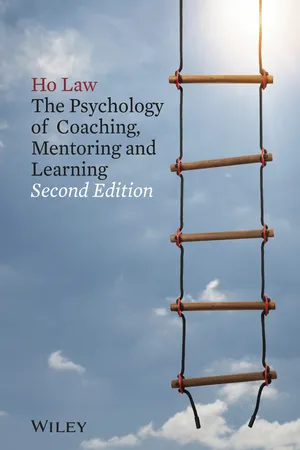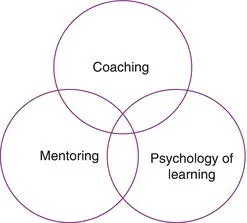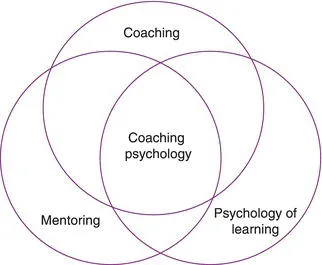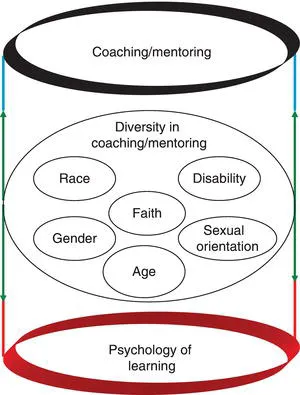
eBook - ePub
The Psychology of Coaching, Mentoring and Learning
Ho Law
This is a test
Condividi libro
- English
- ePUB (disponibile sull'app)
- Disponibile su iOS e Android
eBook - ePub
The Psychology of Coaching, Mentoring and Learning
Ho Law
Dettagli del libro
Anteprima del libro
Indice dei contenuti
Citazioni
Informazioni sul libro
The Psychology of Coaching, Mentoring, and Learning addresses the psychological principles upon which coaching and mentoring is based, and integrates them in a universal framework for the theory and practice of individual and organizational development. The second edition is updated with the latest research, taking into account the increasing importance of positive psychology and its role in coaching and mentoring with an emphasis on strength, growth, and development.
Combining high-level theory with practical applications and case studies, this is an invaluable resource for coaches, mentors, trainers, psychologists, executives, managers, and students.
Domande frequenti
Come faccio ad annullare l'abbonamento?
È semplicissimo: basta accedere alla sezione Account nelle Impostazioni e cliccare su "Annulla abbonamento". Dopo la cancellazione, l'abbonamento rimarrà attivo per il periodo rimanente già pagato. Per maggiori informazioni, clicca qui
È possibile scaricare libri? Se sì, come?
Al momento è possibile scaricare tramite l'app tutti i nostri libri ePub mobile-friendly. Anche la maggior parte dei nostri PDF è scaricabile e stiamo lavorando per rendere disponibile quanto prima il download di tutti gli altri file. Per maggiori informazioni, clicca qui
Che differenza c'è tra i piani?
Entrambi i piani ti danno accesso illimitato alla libreria e a tutte le funzionalità di Perlego. Le uniche differenze sono il prezzo e il periodo di abbonamento: con il piano annuale risparmierai circa il 30% rispetto a 12 rate con quello mensile.
Cos'è Perlego?
Perlego è un servizio di abbonamento a testi accademici, che ti permette di accedere a un'intera libreria online a un prezzo inferiore rispetto a quello che pagheresti per acquistare un singolo libro al mese. Con oltre 1 milione di testi suddivisi in più di 1.000 categorie, troverai sicuramente ciò che fa per te! Per maggiori informazioni, clicca qui.
Perlego supporta la sintesi vocale?
Cerca l'icona Sintesi vocale nel prossimo libro che leggerai per verificare se è possibile riprodurre l'audio. Questo strumento permette di leggere il testo a voce alta, evidenziandolo man mano che la lettura procede. Puoi aumentare o diminuire la velocità della sintesi vocale, oppure sospendere la riproduzione. Per maggiori informazioni, clicca qui.
The Psychology of Coaching, Mentoring and Learning è disponibile online in formato PDF/ePub?
Sì, puoi accedere a The Psychology of Coaching, Mentoring and Learning di Ho Law in formato PDF e/o ePub, così come ad altri libri molto apprezzati nelle sezioni relative a Business e Mentoring & Coaching. Scopri oltre 1 milione di libri disponibili nel nostro catalogo.
Informazioni
1
Introduction
This book is about the psychology of coaching, mentoring and learning. There are many books about learning and mentoring; there are even more about coaching. However, there are very few books that bring together these important, diverse and growing fields, making them intersect. The title of the book reflects the value I place on diversity in the emerging discipline of coaching and how the latter can be enriched by being continuously expanded so as to include mentoring, while it remains grounded in the solid foundation of the psychology of learning.
Aims
The aim of this chapter is to help readers gain a rapid understanding of the nature of the book and find easily the information it offers. It provides a rationale for the book, together with a résumé of its overall structure and a brief description of each chapter. It also suggests how readers working at different levels can use the book to make it meet their interests, experience and professional competence.
Whom Is It For?
The purpose of this book is to show how individuals and organizations can apply the theories and principles of psychology in coaching, mentoring and learning. To this end, the book is written for the following groups:
- coaches, mentors and trainers who would like to learn the general theories and principles of psychology that underpin coaching, mentoring and learning;
- psychologists who want to apply their experience to the coaching, mentoring and training of individuals and organizations;
- senior executives and managers responsible for the use of training budgets, who would like to realize their potential benefit and understand how to design and evaluate effective training programmes for their organizations;
- students of psychology who would like to consider their future career in coaching, mentoring and training.
I am aware that the emerging field of coaching and mentoring, coupled with the popularity of psychology in the UK, will attract a very wide readership. Thus my intended readership is not limited to the categories described above. Readers may well include teachers, instructors and anyone involved in coaching, mentoring, training or supervision.
With the rapid development of coaching and mentoring as an industry, much confusion exists between the psychology of coaching and mentoring and the psychology of counselling and psychotherapy. In comparison to the development of psychotherapy as a discipline, we have found in our disciplines a lot more sharing of practices, which has been promoted by various coaching and mentoring organizations (see Chapter 2).
How This Book Differs from Others
There are many books on coaching and mentoring in the market. However, this book differs from others in the following aspects:
- As far as I am aware, in its first edition, this has been the first book in the UK to attempt to bring together the psychological theory that underpins coaching, mentoring and learning. It embodies a number of developments in coaching and mentoring, as well as in coaching psychology. It traces the development of the Special Group in Coaching Psychology within the British Psychological Society, which addresses coaching psychology as a discipline.
- It reflects the latest thinking, research and development in coaching psychology through high-level theories, principles and practical applications. This second edition ensures that the research and development are up to date.
- It applies psychology to both coaching/mentoring and learning, thereby blurring the boundaries between these disciplines and yet addressing the differences between them.
- It contains cross-cultural elements that make the theories universal and applicable across different cultures.
- It applies, to coaching and mentoring, the general psychology of learning rather than psychotherapy (Chapter 3).
- It demonstrates the know-how and exercises with step-by-step instructions, as well as with case studies from diverse organizational and community contexts (Chapters 7–9).
- It includes a chapter on evaluation that demonstrates the effectiveness of applying the psychology of learning to coaching, mentoring and learning (Chapter 10).
Working terminology
Before you get going, this section offers some pragmatic working definitions to those of you who have no knowledge of coaching, mentoring and learning. These definitions will be further refined in Chapter 4. Broadly speaking, the book talks about processes and activities that support learning. In this context, ‘learning’ can be defined as a cognitive process of acquiring skill and knowledge. ‘Coaching’ is often described as a process of offering support to an individual; this process is performance-focused and goal-centred and it results in action. A ‘mentor’ – a term used in mentoring – is a critical friend who oversees the development of another. All these processes are learner-centred and learner-driven. A theme running throughout this book is the cross-cultural application of coaching and mentoring. ‘Culture’ is broadly defined as the predominant attitudes and behaviour that characterize the functioning of a group, community or organization; we typically apply it to a whole range of contexts: countries, ethnic categories, professions, workplaces. The term ‘cross-cultural’ refers to the interaction between people or entities from two or more cultures. Theories, concepts and techniques will be tested cross-culturally, so that we can see if they are transferable to other contexts and hence valid beyond the original application setting.
Towards the integration of terms
The material provided in this book represents the fertile ground of interaction between coaching, mentoring and psychology (in particular, learning). This triangular relationship can be represented in a simple Venn diagram (see Figure 1.1).
However, as the research and coaching or mentoring journey unfolded, one would discover that there are actually increasing overlaps between the three disciplines. Thus one could see the three circles of influence in Figure 1.1 gravitating towards each other (see Figure 1.2). The next question then becomes clear: How much overlap is there between the three disciplines in practice?
The three are in fact interwoven. Chapter 2 shows that coaching and mentoring are coming of age. It considers market forces, the development of the coaching/mentoring industry and the global market place, and their roles in shaping practice. In order to bring the model of coaching/mentoring and psychology of learning to life, the orientation of this book can be rearranged as a three-dimensional (3D) working model (see Figure 1.3).

Figure 1.1 The ground of fertile overlap between coaching, mentoring and the psychology of learning

Figure 1.2 Increasing the area of overlap between coaching, mentoring and the psychology of learning

Figure 1.3 Working with a 3D model of coaching, mentoring and psychology of learning
In this model, coaching and mentoring are viewed as an interchangeable continuum. Sometimes they may even be regarded as the same thing, depending on the context. For simplicity, the terms coaching, coach and coachee are used to mean coaching/mentoring, coaches/mentors and coachees/mentees respectively (unless their specific meaning is stated explicitly). Whatever the context, due regard should be given to the diversity of all participants in this process. This understanding extends to their appreciation of sensitivities and of the respect that each one should have for the others’ values, beliefs, faith, gender, sexual orientation, social barriers, disability, and racial and cultural backgrounds. To understand the universality and diversity of coachees within a diverse setting, it is important that coaches learn more about the principles and techniques grounded in the psychology of learning and applicable across cultures.
Content in a Nutshell
Coaching and mentoring are different disciplines. Organizations and groups have been set up specializing in coaching and/or mentoring. These include the Association for Coaching, the British Psychological Society’s Special Group in Coaching Psychology, the European Mentoring and Coaching Council, and the International Coaching Federation (see Chapter 2). Coaches and mentors come from diverse backgrounds. While you may not need a degree in psychology in order to be a coach and a mentor, for coaching and mentoring to be effective, you need to understand the psychological principles on which the practice is based. Without this understanding, coaches and mentors risk not achieving their intended outcome.
Drawing on the comprehensive literature in the psychology of learning, this book focuses on linking theory to practical application. The core principles of positive psychology and learning are described in Chapter 3. The same chapter provides a literature review as well as highlighting the philosophy of positive psychology and the learning theories that are useful in coaching and mentoring practice within the tradition of epistemology. (When we refer to epistemology, we mean to question the nature of what we know: fu...